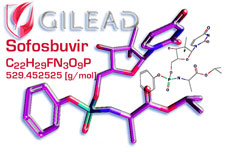 BOSTON, Mass.—On Friday, the U.S. Food and Drug Administration (FDA) approved the new drug sofosbuvir for treatment for chronic hepatitis C. This follows last month’s approval of simeprevir for treatment of chronic hepatitis C. Rebecca Haag, CEO of AIDS Action Committee offered the following statement in response:
BOSTON, Mass.—On Friday, the U.S. Food and Drug Administration (FDA) approved the new drug sofosbuvir for treatment for chronic hepatitis C. This follows last month’s approval of simeprevir for treatment of chronic hepatitis C. Rebecca Haag, CEO of AIDS Action Committee offered the following statement in response:
“Treatment for chronic hepatitis C infection is changing rapidly and holds the potential to dramatically improve the health of those living with hepatitis C. Currently, the standard protocol for treatment of hepatitis C includes interferon, a drug that must be injected and often has unpleasant and acute side effects, including severe fatigue, that can prevent some people from completing the recommended treatment.
“Just two years ago, in 2011, the FDA approved the first two direct-acting antiviral medications for hepatitis C (telaprevir and boceprevir) that have already dramatically improved hepatitis C cure rates, and shortened the length of hepatitis C treatment for some. However, the addition of sofosbuvir and simeprevir for treatment of hepatitis C holds the possibility of the development of effective, interferon-free treatment regimens that will likely improve health outcomes substantially. [pullquote]“People can live with hepatitis for a decade or more before learning they have the disease, which greatly complicates their eventual treatment and increases the costs of care. Additionally, 14 percent of those living with HIV in Massachusetts are also coinfected with hepatitis C, which complicates treatment. We urge everyone to follow the U.S. Centers for Disease Control’s recommendation that all those born between 1945 and 1965 get tested for hepatitis C. Early diagnosis and treatment can—and will—save lives.”[/pullquote]
“People can live with hepatitis for a decade or more before learning they have the disease, which greatly complicates their eventual treatment and increases the costs of care. Additionally, 14 percent of those living with HIV in Massachusetts are also coinfected with hepatitis C, which complicates treatment. We urge everyone to follow the U.S. Centers for Disease Control’s recommendation that all those born between 1945 and 1965 get tested for hepatitis C. Early diagnosis and treatment can—and will—save lives.”
National Facts About Hepatitis
- Hepatitis C is a serious disease that causes inflammation of the liver which can lead to cirrhosis, liver failure, and liver cancer.
- People are often asymptomatic until they develop complications of advanced liver disease, greatly complicating their eventual treatment and increasing the costs of care.
- Screening everyone born between 1945 and 1965 for Hepatitis C, as recommended by the CDC can save an estimated $8.6 billion in national health care costs related to advanced liver disease. (“Economic Model of a Birth Cohort Screening Program for Hepatitis C Virus,” published in Hepatology, March 2012.)
- The number of reported HCV deaths rose 19% from 2006 to 2010, according to CDC, and HCV deaths have exceeded those from HIV/AIDS since 2007.
- New drugs are in trials that have proven effective in reducing viral load to undetectable levels with significantly fewer side effects for patients. FDA approval is expected in early 2015.
Massachusetts Facts About Hepatitis
- There are up to 200,000 people living with Hepatitis C in Massachusetts today with between 7,000 to 10,000 new diagnoses annually.
- An estimated 75% of people living with Hepatitis C in Massachusetts are baby boomers.
- Between 2002 and 2009, the rate of infection among teens and young adults age 15-24 increased 74%, largely driven by the shared use of injection drug equipment.
- In MA, the average age of death of those diagnosed with hepatitis C was 53, compared to 75 for those not infected.
- Among individuals reported with Hepatitis C infection, 73% died within the first five years of diagnosis. This suggests that many people with hepatitis C are getting diagnosed late. (“Massachusetts State HCV Report: An Analysis of the Successes, Challenges, and Opportunities for Improving Healthcare Access With a Focus on People Living With Hepatitis C,” published in 2013 by the State Healthcare Access Research Project (SHARP), The Center for Health Law and Policy Innovation of Harvard Law School, the Treatment Access Expansion Project, and the Massachusetts Viral Hepatitis Coalition.)
- If we don’t slow the infection rate and improve treatment outcomes, the state’s costs for treating people with hepatitis will increase dramatically.
- Of those living with HIV/AIDS in MA, 14 percent are co-infected with hepatitis C.
AIDS Action provides on-going outreach, education, and prevention services to those living with viral hepatitis and at risk of contracting hepatitis C in several critical ways:
- Running a monthly support group for people living with hepatitis C
- Providing one-on-one education at our drop-in centers in Jamaica Plain, Cambridge, and Lynn to those at-risk and infected with hepatitis C;
- Operating two needle and sterile injection equipment exchanges, one in Boston and one in Cambridge;
- Making information about hepatitis freely available to providers, researchers, policy analysts, lawmakers, and the general public via the Health Library and a telephone hotline (888-443-HEPC (4372);
- Referring those newly diagnosed with hepatitis C to medical care and providing the support necessary to keep them connected with care
- Advocating for increased public funding to conduct outreach, education, and prevention to those vulnerable to infection with viral hepatitis, and encouraging those born between 1945 and 1965 to get tested for hepatitis C;
- Convening the Massachusetts Viral Hepatitis Coalition
AIDS Action Committee of Massachusetts is the state’s leading provider of prevention and wellness services for people vulnerable to HIV infection. It provides services to one in six people in Massachusetts living with an HIV diagnosis. These services include HIV counseling and testing; needle exchange; mental health counseling; housing assistance; and legal services. AIDS Action works to prevent new HIV infections, support those affected by HIV, and tackle the root causes of HIV/AIDS by educating the public and health professionals about HIV prevention and care; and advocating for fair and effective HIV/AIDS policy at the city, state, and federal levels. Founded in 1983, AIDS Action Committee of Massachusetts is New England’s first and largest AIDS service organization. In 2013, AIDS Action formed a strategic alliance with Fenway Health that will allow the two organizations to work more closely together and improve delivery of care and services to people living with HIV/AIDS. Learn more at www.aac.org.
[From a News Release]







